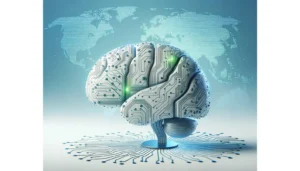Digital transformation in video games with cryptocurrencies
The incorporation of cryptocurrencies in video games it marks a profound change in the industry, allowing new forms of interaction and digital ownership for users.
This digital revolution breaks with traditional closed systems, giving players real control over their in-game assets through blockchain technology.
Thus, the gaming ecosystem expands beyond entertainment, opening unique economic opportunities and redefining the relationship between developers and users.
Democratization of digital property through blockchain
The technology blockchain it allows players to be absolute owners of their digital assets, such as characters or skins, that previously only existed within the game.
This makes it easy to exchange and sell in open markets, using cryptocurrencies like Bitcoin or Ethereum for fast and secure transactions without intermediaries.
In this way, a true one is achieved democratization digital ownership, where each user has control and the possibility of monetizing their virtual assets.
New economical models: play-to-earn and GameFi
The model play-to-earn it allows players to earn real rewards in the form of cryptocurrencies and NFTs by actively participating in the game.
This system fosters autonomous digital economies where users can make a living from their achievements, creating new sources of income within the gaming ecosystem.
Besides GameFi it introduces options such as renting characters or assets to third parties, expanding the financial and investment possibilities within video games.
Impact of cryptocurrencies on esports
The cryptocurrencies they are revolutionizing esports by introducing more efficient methods to compensate players and communities, eliminating intermediaries and improving transparency.
This integration strengthens the relationship between teams and their followers through tokenized reward systems, renewing the competitive experience and their economic model.
In addition, the automation of payments through smart contracts guarantees speed and security, promoting the professionalization of the industry.
Direct compensation and smart contracts
The smart contracts they facilitate instant and secure payments to players, avoiding delays or deductions by intermediaries in tournaments and competitions.
This direct form of compensation reduces costs and risks associated with international transfers, making esports more accessible and fair.
Automated agreements also improve trust between participants and organizers, by executing payments only when established conditions are met.
Tokenized communities and cryptocurrency prizes
The tokenized communities they allow fans and players to actively participate in the team's economy through tokens that offer exclusive benefits and investment opportunities.
Cryptocurrency prizes encourage loyalty and commitment, as participants receive tangible rewards with real value and liquidity in the market.
This dynamic generates an ecosystem where interaction goes beyond competition, strengthening connection and the sense of belonging.
Organization of tournaments with automatic payments
Blockchain-based systems allow the organization of tournaments where the automatic payments they are executed instantly using smart contracts at the end of the competitions.
This eliminates bureaucracy and potential fraud, ensuring that prizes reach their recipients quickly and transparently.
Additionally, this technology encourages greater participation and trust, as all financial processes are regulated and publicly auditable.
Innovation and applications of NFTs in gaming
The NFTs they have revolutionized the concept of digital property in video games, allowing players to own unique and unrepeatable assets in and out of the game.
This technology enables the creation of exclusive collectibles that can be bought, sold or exchanged in open markets, generating new forms of digital economy.
In addition, NFTs open the door to unique and personalized experiences, enriching the interaction between players, developers and communities in the gaming ecosystem.
Unique digital property and collectibles
NFTs make digital assets authentic and non-replicable, ensuring exclusivity of skins, characters and collectibles in video games.
This allows players to have real control over their virtual assets, which can increase in value over time and become investments.
Thus, the limitation of traditional games is overcome, where objects only had value within the software and could not be freely exchanged or sold.
NFT markets and exclusive experiences
NFT markets make it easy to buy and sell unique digital assets, connecting buyers and sellers globally using cryptocurrencies.
These platforms also offer access to exclusive content and special events, which function as keys within games or experiences in the metaverse.
Thus, NFTs are not only collectibles, but also tools to access personalized experiences and build more engaged communities.
Challenges and the future of crypto and gaming integration
The integration of cryptocurrencies and gaming presents challenges such as high volatility, unclear regulations and security risks that affect users and platforms.
These difficulties require innovative solutions to guarantee a safe and stable environment that allows taking advantage of the economic and technological potential of the sector.
On the horizon, the union of crypto and gaming promises to transform the industry, but addressing these obstacles will be key to promoting its sustainable growth.
Risks: volatility, regulation and security
The volatility inherent cryptocurrencies can negatively impact the value of profits within video games, generating uncertainty for players and investors.
Also, the lack of one clear regulation in many countries it makes mass adoption difficult, exposing users to possible fraud and legal problems.
The security risks they are significant, including hacks, scams and vulnerabilities in smart contracts that can compromise digital assets.
Emerging economic prospects and opportunities
Despite the challenges, they exist economic opportunities unique with the fusion between cryptocurrencies and gaming, opening new sources of income and innovative models.
Tokenization and NFTs allow us to create global markets and exclusive experiences, promoting direct monetization and community loyalty.
With technological and regulatory advancement, sustained growth is expected that will further integrate players into the digital economy.






